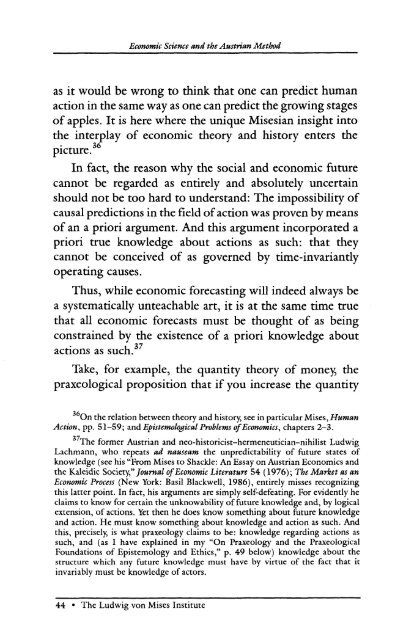Economic Science and the Austrian Method_3
Economic Science and the Austrian Method_3
Economic Science and the Austrian Method_3
- No tags were found...
You also want an ePaper? Increase the reach of your titles
YUMPU automatically turns print PDFs into web optimized ePapers that Google loves.
<strong>Economic</strong> <strong>Science</strong> <strong>and</strong> <strong>the</strong> <strong>Austrian</strong> <strong>Method</strong>as it would be wrong to think that one can predict humanaction in <strong>the</strong> same way as one can predict <strong>the</strong> growing stagesof apples. It is here where <strong>the</strong> unique Misesian insight into<strong>the</strong> interplay of economic <strong>the</strong>ory <strong>and</strong> history enters <strong>the</strong>. 36pIcture.In fact, <strong>the</strong> reason why <strong>the</strong> social <strong>and</strong> economic futurecannot be regarded as entirely <strong>and</strong> absolutely uncertainshould not be too hard to underst<strong>and</strong>: The impossibility ofcausal predictions in <strong>the</strong> field ofaction was proven by meansof an a priori argument. And this argument incorporated apriori true knowledge about actions as such: that <strong>the</strong>ycannot be conceived of as governed by time-invariantlyoperating causes.Thus, while economic forecasting will indeed always bea systematically unteachable art, it is at <strong>the</strong> same time truethat all economic forecasts must be thought of as beingconstrained by <strong>the</strong> existence of a priori knowledge aboutactions as such. 37Take, for example, <strong>the</strong> quantity <strong>the</strong>ory of mone~ <strong>the</strong>praxeological proposition that if you increase <strong>the</strong> quantity360n <strong>the</strong> relation between <strong>the</strong>ory <strong>and</strong> history, see in particular Mises, HumanAction, pp. 51-59; <strong>and</strong> Epistemological Problems of<strong>Economic</strong>s, chapters 2-3.37The former <strong>Austrian</strong> <strong>and</strong> neo-historicist-hermeneutician-nihilist LudwigLachmann, who repeats ad nauseam <strong>the</strong> unpredictability of future states ofknowledge (see his "From Mises to Shackle: An Essay on <strong>Austrian</strong> <strong>Economic</strong>s <strong>and</strong><strong>the</strong> Kaleidic Society," Journal of<strong>Economic</strong> Literature 54 (1976); The Market as an<strong>Economic</strong> Process (New York: Basil Blackwell, 1986), entirely misses recognizingthis latter point. In fact, his arguments are simply self-defeating. For evidently heclaims to know for certain <strong>the</strong> unknowability offuture knowledge <strong>and</strong>, by logicalextension, of actions. Yet <strong>the</strong>n he does know something about future knowledge<strong>and</strong> action. He must know something about knowledge <strong>and</strong> action as such. Andthis, precisely, is what praxeology claims to be: knowledge regarding actions assuch, <strong>and</strong> (as I have explained in my "On Praxeology <strong>and</strong> <strong>the</strong> PraxeologicalFoundations of Epistemology <strong>and</strong> Ethics," p. 49 below) knowledge about <strong>the</strong>structure which any future knowledge must have by virtue of <strong>the</strong> fact that itinvariably must be knowledge of actors.44 • The Ludwig von Mises Institute


